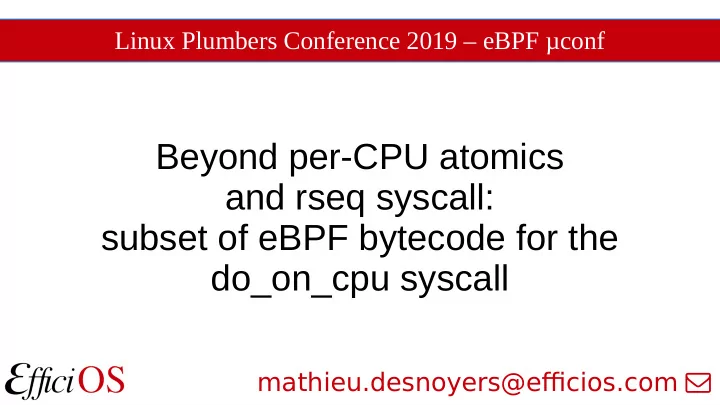

Linux Plumbers Conference 2019 – eBPF µconf Beyond per-CPU atomics and rseq syscall: subset of eBPF bytecode for the do_on_cpu syscall mathieu.desnoyers@efcios.com
Restartable Sequences (RSEQ) in a nutshell ● System call registering user-space TLS data, ● TLS data acts as ABI between kernel and user-space, ● Enables user-space to implement efficient per-CPU data accesses. 2
The need for a system call fallback to RSEQ ● Concurrent update of remote user-space per-CPU data, – Aware of CPU hotplug, ● Early/late per-CPU data use in libc initialization and thread life-time, ● Single-stepping through RSEQ with existing debuggers. SYSCALL_DEFINE5(do_on_cpu, struct bpf_insn __user *, ubytecode, u32, len, int64_t __user *, uresult, int, cpu, int, flags) 3
do_on_cpu RSEQ fallback requirements ● Not a fast-path, ● Large number of eBPF programs can exist in user-space memory: – Preloading them into the kernel is impractical wrt memory consumption, ● Received as parameter from a system call for single-use, ● Execute on a specific CPU received as parameter, ● Preemption disabled critical sections (exclusive per-CPU data access), ● Only access user-space memory and interpreter registers: may fault with preemption disabled . 4
do_on_cpu runtime interpreter ● Upstream Linux eBPF infrastructure not useful for do_on_cpu: – Load/store of stack, kernel data, – All calls to external functions, – Most of eBPF verifier, – eBPF bytecode to native code JIT, ● Currently, do_on_cpu implements its own: – Bytecode validation, – Bytecode interpreter (with loops support), – User-space to kernel memory mapping translation. 5
Additional eBPF extensions required ● Define an eBPF memory model, ● New instructions specifying memory ordering: – Load-acquire, – Store-release, – Memory barrier, ● Preemption disable/enable: – Allow disabling preemption for short bounded critical sections, – Minimize scheduler latency impact for preempt-RT. 6
Additional Slides (if required by discussion) ● Handling page-faults with preemption disabled, ● Handling execution mismatch between passes. 7
Handling page-faults with preemption disabled ● Multi-pass scheme: 1) Create kernel mapping of memory: ● Grab reference to each user-space page touched by bytecode, ● Create vmap aligned on same page colour as user-space pages (for virtually-aliased architectures), ● Enable preemption and restart bytecode interpretation each time a new page is added to the set, 2) Perform store side-effects. 8
Handling execution mismatch between passes ● Caused by changes in data loaded from user-space (tainted register): – Address for load/store from/to user-space memory, – Conditional branch, ● Handling of changes detected within pass (2) (store side-effects): – Restart if change detected before any store side-effect, – Return EIO (corruption detected) if change detected after side-effect is visible to user-space. 9
Recommend
More recommend